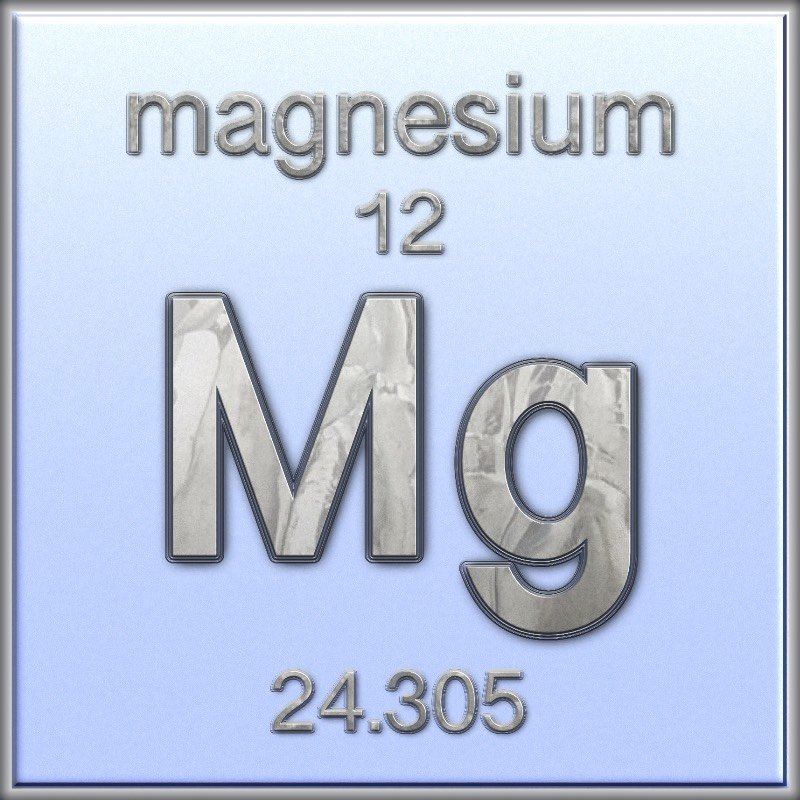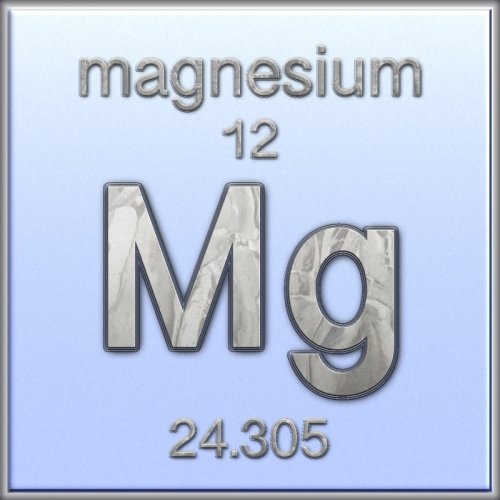
Introduction
Biologically, life can be partly described as a series of biochemical reactions. Magnesium happens to be the key to hundreds of these critical enzymatic reactions in the body.
Magnesium also has the very important role in the body of acting as a natural biological antagonist to calcium. Since unbalanced calcium levels, or unregulated calcium can be quite harmful, understanding and supplementing magnesium can be critical to health. If that statement sounds surprising, consider reading the book, Death by Calcium, for more information.
Due to changes in our food supply, soil depletion, dietary choices, and environmental toxins, it appears that with few exceptions, we, as a nation, are magnesium deficient. Dr. Levy's book on Magnesium is an invaluable resource if you'd like a deeper understanding of this critical nutrient. For a quick read loaded with more magnesium information, this blog post by Health Ranger is a great writeup, or this one which also discusses how to test for magnesium (RBC test).
In the context of mercury from dental amalgams, magnesium becomes even more critical. Mercury competes with magnesium, and sadly out-competes it. Mercury will therefore block magnesium from doing its numerous and very important jobs in the body. There are many dramatic effects caused by this, so it's important to be very aware that mercury makes one "extra deficient" in magnesium. (Fluoride also depletes magnesium, and so can vitamin D supplements or calcium supplements.)
One interesting enzyme sequence that requires magnesium is the synthesis of natural vitamin D. Magnesium-dependent enzymes are tasked with converting the storage form of vitamin D in the body to the active form of vitamin D. Mercury blocks this process and can cause a vitamin D deficiency which can lead to chronic disease (e.g., cancer, heart disease, cavities, osteoporosis) and a long list of other problems. This is one reason why vitamin D deficiency appears to be common. The answer to a vitamin D "deficiency" starts with magnesium, not necessarily a vitamin D supplement.
Balancing calcium and mitigating mercury's harmful effects is step one on your biological journey. This starts with magnesium supplementation. So how much is needed?
Dosing
Everyone has different needs of course, but a good starting point is around 5mg per pound of body weight per day in divided doses. This can later be refined up or down based on your individual results and needs. Just multiply your weight in pounds by 5 and get the total amount in milligrams of magnesium you need per day. For example, the average adult weighing 160 pounds will need about 800mg a day (but not all at once).
The body will only absorb about 200mg at once. Anything higher may be wasted or may cause GI upset. Therefore your daily dosing goal should be spread out into smaller doses. Use at least FOUR smaller doses per day. So, for example, take about 200mg with breakfast, 200mg with lunch, 200mg with dinner, and 200mg before bed.
It is difficult, but not impossible to overdo magnesium. In case you approach your body's limit, you may feel light-headed from decreased blood pressure. If so, just back off the dose by 10% and try again the next day. The symptoms should pass within seconds or minutes. If not, a little bit of sea salt can help. Overdosing is more likely when supplementing through multiple routes simultaneously such as epsom salt baths, topical "oils," and oral supplements.
Other Electrolytes
Magnesium and calcium counter-balance each other. Taking magnesium lowers calcium which is usually what we want. However, magnesium, sodium, and potassium are in a love-hate triangle of their own where raising any of the three will lower the other two. Therefore it often becomes helpful to supplement sodium and potassium too. This is best discussed with your functional doctor who can help you obtain the ideal mineral balance possibly by using a hair mineral analysis test..
Types of Magnesium
There are many types, some great, some with potentially harmful side-effects. The table below outlines what is important to know about each one. Note, there are a few additional forms of magnesium not on this table such as orotate, lactate, hydroxide, gluconate, and carbonate, but these are not as commonly associated with magnesium.
Each type of magnesium has different targets and effects. The best types are listed at the top of the table in green followed by very good ones in blue. The orange ones are not too useful as a source of magnesium. And potentially harmful types are in red at the bottom. When choosing supplements, focus on the top four types: magnesium malate, glycinate, threonate., and taurate.
Magnesium malate is energizing so you may want to use this in the morning / afternoon.
Magnesium glycinate is relaxing so seems most appropriate for evenings and before bed.
Magnesium threonate is great for brain health and may be the only type that crosses the "blood-brain barrier," getting magnesium to the brain where it's needed. Threonate capsules come in smaller doses (about 50mg -- check the dosing label carefully) so this can help if your desired dose is a multiple of 50 instead of 100. Taurate comes in about 40mg per capsule. Magnesium malate, glycinate, or blends usually come in around 100mg per capsule.
| Forms of Magnesium | ||
| Malate | Great, easy to find. Affordable | Energizing. Good for muscles, cramps, RLS, fibromyalgia, chronic fatigue, metabolism. May help detox aluminum. |
| Glycinate | Great, easy to find. Affordable | Relaxing. Good for sleep, nerves, headaches, intestinal issues (leaky gut), anxiety, and inflammation. |
| Threonate | Great but pricey. Lower dose capsules | May be energizing. Good for the brain, memory, mood, anxiety, brain injuries, depression, cognition, brain fog. |
| Taurate | Great but pricey. Lower dose capsules | Good for the heart, headaches, blood sugar issues. Can help reduce heart attack risk. |
| Sulfate | Good for specific uses | This is epsom salt used in baths. It can also be taken orally, but shouldn’t be used as a main form of supplementation. |
| Chloride | Good for specific uses | This is called “oil” and best used topically. Oral doses can function as electrolytes and help the kidneys. |
| Oxide | Not really useful | MgOxide has only a 4% absorption rate, but it is a naturally-occurring form. It's often used as a laxative or for heartburn. |
| Citrate | Harmful | Avoid. Although commonly available, citrate is the worst choice. It is made from GMO mold and interferes with copper and iron regulation, leading to health problems. |
| Glutamate | Harmful | Avoid. Glutamic acid can be neurotoxic and worsen symptoms such as depression and anxiety. |
| Aspartate | Harmful | Avoid. Aspartic acid is related to aspartame, the artificial sweetener that has been banned in some countries due to its link to metabolic disorders, brain tumors, and more. |
| Stearate | Harmful | Is a trans-fat used to lubricate capsules and ingredients. Please avoid any brand that still uses stearates. Many brands have moved past this questionable practice. |
My recommendation is to study this table, choose the brands you want (suggestions below), and make a schedule for yourself that you can follow.
Dosing Schedule Example
Starting with the suggestions here, you may customize a table for yourself based on your desired brands, forms, and dose. It can be as simple as you want, or as refined as you like. Remember, your daily goal is weight x 5. For example, if you weigh 120 pounds, your total daily goal is 600mg.
| Weight: | 120 lbs | 160 lbs | 200 lbs | ||
| 100 mg 50 mg | 100 mg 100 mg | 200 mg 50 mg | Mg Malate (energizing) Mg Threonate (brain) | With Breakfast | |
| 100 mg 50 mg | 100 mg 100 mg | 200 mg 50 mg | Mg Malate Mg Threonate | With Lunch | |
| 100 mg 50 mg | 100 mg 100 mg | 200 mg 50 mg | Mg Malate Mg Threonate | With Dinner | |
| 150 mg | 200 mg | 250 mg | Mg Glycinate (relaxing) | Before Bed | |
| Total: | 600 mg | 800 mg | 1000 mg |
Suggested Brands
Capsules are convenient, and powders (bulk) provide flexibility. Capsules with a blend of magnesium malate and glycinate work well, and have a neutral effect on energy. So, if you prefer a more simple approach, instead of using the three different forms seen in the dosing table above, you can choose just one type such as the NutraBio or Innovix Labs supplement and use only that. For example, if you weight 160 lbs, your daily goal is 800mg. You would take 200 mg (or 2 capsules of the NutraBio brand) with breakfast, lunch, dinner, and before bed.
| Magnesium | |||||
| Type | Form | Source -- Brand | Dose per cap | Additional Sources | |
| Malate-Glycinate blend | capsules | NutraBio | 100mg | ||
| Malate-Glycinate blend | capsules | Innovix Labs | 105mg | iHerb | Amazon |
| Malate | powder | Chief Originals (Health Ranger) | |||
| Malate | powder | Seeking Health (Dr. Ben Lynch) | |||
| Glycinate | powder | Chief Originals (Health Ranger) | |||
| Glycinate | powder | Seeking Health (Dr. Ben Lynch) | |||
| Glycinate | capsules | Klaire Labs | 100mg | ||
| Threonate | capsules | Dr. Mercola | 48mg | iHerb | Amazon |

Categories: Supplements




